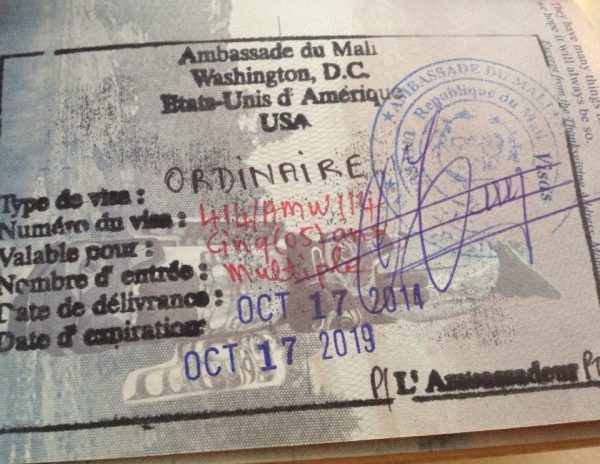
I am going to West Africa next month. On November 23, I will arrive in Bamako, Mali and spend one week there before moving on to neighboring Burkina Faso, eventually flying out of Ouagadougou on December 6.
I booked my flights back in September and finalized an itinerary for the whole trip in the last week or so. It all became truly official when I picked up both of my visas while I was in Washington, D.C. for work this week.
I have been anticipating this trip since last spring, when representatives from buildOn let me know that it would be possible to go to visit the schools that Passports with Purpose raised money for them to build in southern Mali (I’m on the board of PwP and last December, we raised $84,000 for buildOn in our annual fundraiser). The timing over Thanksgiving is perfect both in terms of not needing to take as many vacation days and weather-wise, being the dry season in Mali and Burkina Faso. More importantly, the schools have now been completed and classes will be in session during my visit.

My enthusiasm about picking up my visas this week was somewhat tempered, though, by the news that the first case of Ebola had been reported in Mali.
This really didn’t come as a shock and frankly, I’m kind of surprised it hasn’t happened sooner. Mali borders Guinea, which is where this outbreak of Ebola began. Back in August, as Ebola was spreading through Guinea, Liberia and Sierra Leone at unprecedented rates, I even briefly reconsidered this trip. But after meeting with someone at the travel medicine clinic at Northwestern Memorial Hospital, checking in with my contact at buildOn and exchanging emails with blogger Phil Paoletta who is currently living in Mali, I became comfortable that the risk of Ebola for a traveler to countries like Mali and Burkina Faso, with no known cases of Ebola, was very low.
One case of Ebola in Mali doesn’t change that. Here’s why:
- The one case was diagnosed in Kayes, a city in the western part of Mali, nowhere near where I am planning to go. The girl did travel through other cities, including the capital of Bamako (where she only spent two hours), while she was symptomatic, but people still would have had to come into contact with her bodily fluids to become infected.
- The victim was a two-year-old child who had traveled from Guinea and they have quarantined her, her family members and more than 40 others known to have come into contact with her. It seems possible that this could be contained, similar to the cases in Senegal and Nigeria. Both countries have now been declared Ebola-free.
- Even if it is not completely contained, it is still not easy to catch. As the media keeps repeating over and over, Ebola is not airborne. Consider this: the family members of Thomas Eric Duncan, the Liberian man who died of Ebola in Dallas, lived with him for multiple days while he was sick and none of them got Ebola. Likewise, Patrick Sawyer (the man who arrived in Nigeria by plane sick with Ebola) only passed it on to a handful of health care workers who treated him before knowing he had Ebola. No one on his plane got sick. And no one beyond those health care workers got sick.
- There are still tourists wandering around West Africa – not many, I’m sure, but still some (Phil mentioned meeting travelers who had been through Sierra Leone with no issues). Yet the only Westerners who have caught Ebola are health care workers who were treating Ebola patients and the NBC cameraman who was covering the situation and was frequently in the vicinity of victims. I won’t be.
- People can’t spread Ebola until they start showing symptoms and the sicker they are, the more contagious they are. Thus, the chances of rubbing up against someone out in public and getting Ebola is very low – if they are well enough to be moving around, they probably aren’t contagious enough to make me or anyone else get sick.
- Even in Monrovia, the capital of Liberia, where the virus is spreading the fastest, the risk of contracting Ebola is low – estimated to be 1 in 5,000, which is on par with the risk of dying in childbirth in the United States (1 in 5,500). The risk in Mali, with only one known case at this time, is much, much lower.
So yes, I am still going to Mali and Burkina Faso.
Will I be cautious? Yes.
Will I let fear ruin my trip? Absolutely not.
For more on Ebola:
What is the risk of catching Ebola on a plane?
Understanding the risks of Ebola and what ‘direct contact’ means
Questions and Answers on Ebola on the CDC website
WHO: Ebola doesn’t spread through the air like a cold
An Ebola survivor exemplifies how we should all react to the New York case
